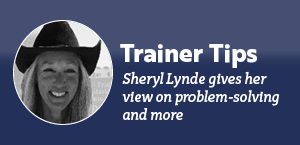By Sheryl Lynde | Horsetrader columnist

Studies show that one third of the people asked about their job will tell you that they hate it. Two thirds of people will tell you that they feel a lack of purpose or fulfillment. They feel that their job is not a good fit for them even though they are great at performing the tasks of their position and are financially successful.
We spend 40 percent of our lives working. Abraham Maslow, author and American psychologist, created a hierarchy of needs he felt were essential in order for us to feel a sense of contentment in our lives. At the bottom of the list is the first level that is concerned with our physiological needs. These needs determine your ability to provide for your basic demands for survival and safety, such as shelter, food, etc.. At the top of the list is self-actualization, which refers to the ability to realize, grow and contribute whatever your innate gifts or skills that you possess. To be authentic, to bloom or realize your full potential, self actualization is a critical component to your sense of belonging and your self worth.
We need to feel valued. Skills are unique to each individual. Not being true to whom we are creates resistance and results in development of behavioral issues like irritability, anger, lack of patience or exhaustion. We feel trapped or unappreciated. We perform our tasks either mechanically or resentfully and live for the weekends. We try and remedy our behavioral issues with overspending, overeating, over imbibing, but we are only addressing the symptoms. Without treating the cause, which is not being true to ourselves and living our purpose-driven life, the symptoms continue and worsen over time.

Where am I going with this? Stay with me; you will see the parallel I’m trying to uncover.
The same applies to our horses. They are all individuals with different needs and abilities. Even though a horse may be bred for cowhorse or cutting or hunter-jumper, it is not a guarantee that he will flourish or thrive in the rigors of the show pen. They may develop behavioral issues such as rearing, bucking or balking while practicing or performing in the show pen. They may just simply refuse to do what is being asked of them.
I had a client bring me a horse they had trained in cutting. Even though he was well-bred and had siblings realize a very successful career, his heart wasn’t in it. Even though he had the talent, he couldn’t tolerate the hours of training required to produce a successful competitor. In his last show, he just quit. He refused all requests from his rider. By the time he came to my place, his eyes had no life, just a glaze.
We spent most of our time out in the hills and away from the arena. It took hours for him to learn how to navigate different footing, such as hills and arroyos, but he learned. I felt his joy come back. Little by little, I asked him to perform the tasks that he had been trained to do around shrubs and brush, such as rollbacks, backing around trees, etc., just to keep his mind engaged and his physical well-being in shape. But we also just sat, allowing him time to take in his new surroundings. We had a new arena, the hills and a never-ending expanse without fences. He was a wonderfully skilled horse, but he just wasn’t in the right job for him to shine.
The owners expressed their gratitude in having their horse back. They will need to keep him engaged and explore his talent and ability without adding pressure. It’s a balance of time in the arena and time out in the hills.
Conversely, a horse may enjoy his job competing in his discipline, but due to unforeseen circumstances such as finances, injury, or a lack of talent needed to be competitive at a certain level, he has been culled from his training program or sold. He will need time to adjust to a different life. If he is used to being active and to having his mind engaged, a more sedentary life may prove challenging. When boredom seeps into his existence, so do unwanted issues such as ulcers or biting or kicking. It’s important to take an assessment of your horse’s abilities, breeding, likes and dislikes. If you are tuned into your horse and are aware—if you listen, he will tell you. You can feel it.
Just as you need to be authentic and be the best you were created to be, so does your horse. Allow him to realize his gifts and talents that are unique to him. You will be rewarded with a grateful companion.
–Sheryl
Leave a Comment
All fields must be filled in to leave a message.